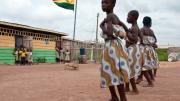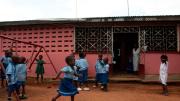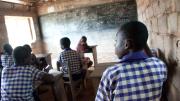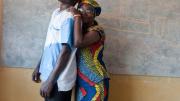This summer I worked as an intern for Students of the World, a nonprofit media-production company dedicated to pairing teams of college students with nonprofit organizations. My team—seven students from Harvard, Boston University, and the University of Texas at Austin, each of us with a specific role such as filmmaker, journalist, producer, or development coordinator—was partnered with Opportunity International in Ghana—a microfinance organization that operates in developing countries worldwide and provides services such as micro loans, mobile banking, financial advice, and training to farmers, school proprietors, and other small-business owners and entrepreneurs.
One initiative that we spent a large amount of time documenting was Opportunity International's Banking on Education program and its partnership with the IDP Rising Schools Program. Ghana has a free public-school system throughout the country, but the quality of education provided is generally very low because of factors such as extremely large classes and irregular teacher attendance. Private schools are thus an important alternative, and make up 80 percent of the top-ranked schools in most districts. But because such schools are so costly, many parents cannot afford private education for their children, even though they view the government schools as a waste of time and resources. Furthermore, even many private schools are often in need of more funding and better infrastructure, as well as a sufficient supply of classrooms, books, school vehicles, furniture, and toilet facilities.
To aid these struggling private schools and the projected 1.6 million children who attend them, Opportunity International's Banking on Education program offers loans to private schools and training to school proprietors. Proprietors use the loans to hire better teachers, improve the infrastructure of their buildings, create more classrooms, and make other improvements. Often Opportunity International also provides loans to assist parents with the cost of tuition. Two of the schools where we filmed, Desmercy School Complex and Samrit Academy, are part of this program; they are located in Zenu New York, Ghana, in a village about a two-hour drive from Accra. The two other schools we visited, Christ Is the Answer Preparatory School and Romesco International School, are both located in the village of Adansi Dompoase, outside Kumasi, and are part of a similar initiative handled by the IDP Rising Schools Program (in collaboration with Opportunity International and Sinapi Aba Trust). These groups have provided loans to private schools. In addition, school proprietors, teachers, and the caterers who provide food for the students during lunch hour receive training for their respective jobs.
The most surprising aspect of these schools was their heavy emphasis on computer training and on information- and communication-technology (ICT) classes. Every school we visited had incorporated ICT training into its curriculum, so students learned skills like typing and were introduced to the anatomy of a computer—its structure and function. Though some schools, such as Samrit Academy, had their own computer labs, others were hoping to acquire computers through future microfinance loans. Many of the parents we met commented on the fact that computer-training skills are not just useful but essential. Emanuel Akoto, whose son attends Samrit Academy, said, “In my age, you had to travel to see a computer…the whole world will improve through the Internet.”
The juxtaposition of children learning about modems and hard drives in classrooms that often lacked or had only recently acquired cement walls or basic toilet facilities was striking but showed the efforts of private schools to prepare Ghanaian children for their futures despite challenges and lack of resources. The Ghanaian educational curriculum reflects the awareness that computer skills are not just the domain of the wealthy, but are important for social mobility for children of all economic classes.




















